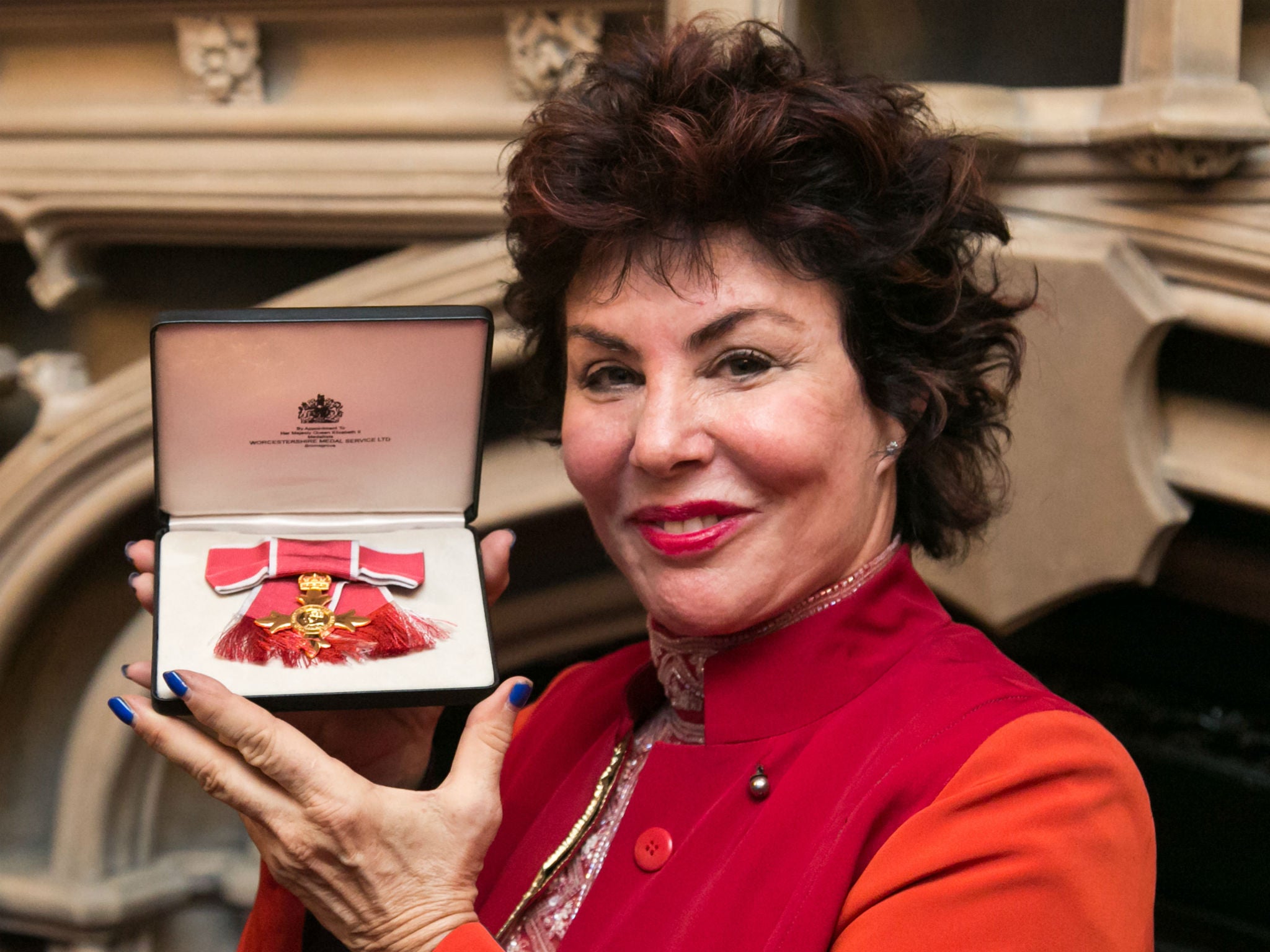Ruby Wax: Mental health campaigner discusses reducing stigma, depression and the pressures on young people
Wax told the Independent the stigma may be reducing, albeit slowly, 'It's like humans are supporting each other now – it's the latest craze'

Your support helps us to tell the story
From reproductive rights to climate change to Big Tech, The Independent is on the ground when the story is developing. Whether it's investigating the financials of Elon Musk's pro-Trump PAC or producing our latest documentary, 'The A Word', which shines a light on the American women fighting for reproductive rights, we know how important it is to parse out the facts from the messaging.
At such a critical moment in US history, we need reporters on the ground. Your donation allows us to keep sending journalists to speak to both sides of the story.
The Independent is trusted by Americans across the entire political spectrum. And unlike many other quality news outlets, we choose not to lock Americans out of our reporting and analysis with paywalls. We believe quality journalism should be available to everyone, paid for by those who can afford it.
Your support makes all the difference.Ruby Wax’s role as a mental health campaigner has recently been cemented in her receiving an honorary OBE. Aptly, she chose to commemorate the occasion at the Priory hospital where Wax has received treatment herself, demonstrating her commitment to reducing stigma around mental health issues.
The 62-year-old has focused much of her attention on mental health awareness in recent years after being particularly open about her struggles with depression. She performed a stand-up show dedicated to the issue, completed a masters course on Mindfulness-Based Cognitive Therapy at Oxford University, has written a book on the subject and now is planning on opening walk-in centres.
Prior to this, Wax was best known for her presenting and stand-up comedy. Her BBC series Ruby Wax Meets… which started in 1996 and featured interviews with the Duchess of York, Pamela Anderson, Madonna and Donald Trump - the latter, given the state of affairs we’re currently in, is worth re-visiting.
The Independent spoke to Wax after she received her accolade to discuss depression, mindfulness and what more needs to change to fight stigma.
On the biggest misconceptions surrounding depression:
Wax has previously spoken about the way depression is wrongly simplified, telling ITV news last year: “It’s a living death”. Wax says part of the problem is to do with the word itself. “The word depression is deceptive because it implies that it has to do with a mood whereas real depression should be more like a waking coma. That would be too long to use but it isn't being alive, it’s being unconscious but you’re still moving and still walking.”
Another misconception is that it’s an act of “imagination” or you can think your way out of it without getting proper help, she says. “To me, that’s like saying to somebody with Alzheimer's that they should try and remember where they parked their car. With depression just forget the word, the person has a broken part of their brain, they’re broken.”
On mental health treatment centres:
Wax believes the contrast between how physical and mental health are treated in the UK contributes to the stigma. “We live in a world where, imagine if you had cancer and there weren’t enough beds, imagine the outcry. There are people who are literally on the verge of suicide, as we see from the statistics, that have nowhere to go, so the parity between mental and physical is going to change. It has to.”
She says improving treatments for mental health is necessary for the benefit of society. “If it doesn’t improve, what do you think criminals - drug abuse, domestic violence, paedophilia - all of those are a mental disorder so if you can take care of it, everything falls into place.”
Other sources of stigma surrounding treatment centres can come from a misunderstanding of rehabilitation centres by associating them with ‘celebrities’. “When people give mental institutions a bad name saying it’s a celebrity thing I hope they’re around when somebody commits suicide and realises what they’ve done,” she affirms.
On the stigma of mental health in the workplace:
Wax says stigma in the workplace is prevalent largely because mental health issues are often misunderstood. “The person has something broken, their brain is broken, they didn’t wake up one morning and think should I have this or take up golf?” She also points to the fact that billions are lost every year in business due to mental health in terms of absenteeism and other issues, in 2012 that figure was estimated to be £26billion per year. “Even if you don’t care about it, it’s your money going down the tube […] Even if you don’t care about it it’s gonna hit you one way or another, if it’s not you it’s your mother, or cousin, or friend so I don’t think there’s any place to run or hide anymore the numbers are too high.”
She is adamant the law has to change in order to protect workers with mental health issues and combat the stigma. “Three people in my audience [of one of my shows] said, ‘I have cancer and mental illness, and mental illness is way worse because with cancer I wanted to live and with depression I wanted to die’. And [with cancer] they get sympathy because you can see their hair falling out, with depression people just tell you to perk up like you didn’t think of that one.”
On helping a family member or friend who may be struggling with mental health issues:
Wax is planning to launch walk-in centres and says she is already in talks with a high-street retailer for it to take place in their stores. She thinks these would be an ideal place for concerned friends and family to meet others who might be going through the same thing. “You really need to meet people in a similar situation to compare notes because this isn’t concrete and so it's like bereavement they can all compare notes […] they’d have buddy systems like AA (Alcoholics Anonymous) [where one person could say] ‘I can’t take this anymore’ and the other guy would talk him through it.”
On how the pressures facing young people today can contribute to poor mental health:
“There wasn’t cutting when I was growing up and [now] you have to compete with Cara Delevingne for looks, she says. “Now it’s not acceptable to be too fat, not good looking, not sexy enough, not put it out as much. The competition’s now with the world instead of your neighbourhood.” This is something Wax believes has got worse in today’s society, possibly due to the influence of the digital age. However, she is reluctant to complain about technology as “it’s there, we put it there” but adds we need to know “when to shut down” and when to press that off-switch.
Another example she gives of increased pressures are reality TV shows and competitions. “We’re idolising people that don’t have talent […] and now because it’s possible for anybody you kind of feel like a failure that you didn’t show up.
“It’s entitlement. That’s why we get people on the X Factor with the talent of a tooth pick. Just show up to the event and take your pants off and you’re in,” she says firmly.
These are just examples a “tiny little hair of the pressures” Wax says, along with family life “breaking apart” and more drugs being available all contribute to the pressures on young people today.
On mindfulness:
Mindfulness is something that Wax has found to be beneficial to her own mental health but says it can vary from person to person. “It’s like anything,” she says. “We’re all different finger prints so what works for one guy is really gonna make the other one miserable.” Her book A Mindfulness Guide for the Frazzled was released last month, which she says she wrote because “the statistics are so impressive otherwise I would have gone in for tree hugging”.
“I really researched the scientific evidence because I'm not into the fluffy stuff and the only reason I went for MBCT is because the results are so incredible, for everything not just depression. They should certainly use it in schools.”

On receiving her honorary OBE at the Priory:
“It was the happiest day of my life, besides giving birth which I wasn’t awake for so I couldn’t tell you,” Wax says. She admits that being American-born she “didn’t get the Britishness of it all - why would I?” but after experiencing it now understand why people curtsey in front of the Queen. “It was the most sombre thing I've ever done so I almost thought I was gonna pass out,” she recalls. Wax says the reception at the Priory was warm and those staying at the facility “seemed really positive about somebody representing them”. “Once in a while there would be an inmate coming in because the staff would introduce me and it was just perfect.”
On whether the stigma surrounding mental health is reducing:
In order for this stigma to keep reducing she says people shouldn’t be afraid about admitting it.
“It’s coming out more, it’s just like the gay movement if enough people admit it then there’s spikes in numbers. I think that has to happen […] so then if you dare discriminate you have a whole committee behind you rather than each person fighting their own battle."
She has noticed more people speaking openly about their mental health, especially at her shows. It was initially difficult for people to open up, she says but now, "middle class, gay, straight, old, young, they want to stand up and go: ‘I’m only talking about myself because I wanna show you I’m brave enough to do it’ and so it’s like humans are supporting each other now which is a new thing, it’s the latest craze".
A Mindfulness Guide for the Frazzled is available now.
Join our commenting forum
Join thought-provoking conversations, follow other Independent readers and see their replies
Comments